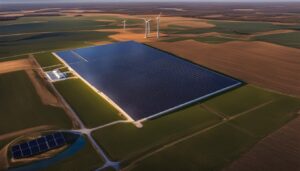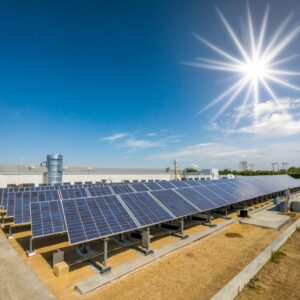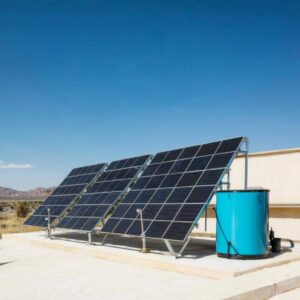
Geothermal energy and solar power are two key contenders in the race for sustainable energy solutions. As our world strives towards a cleaner energy future, these renewable sources have emerged as powerful players in the quest for sustainability. Both geothermal energy and solar power offer unique advantages and costs, and their impact on our clean energy future is a topic of much debate.
Key Takeaways:
- Geothermal energy and solar power are renewable energy sources.
- Geothermal energy harnesses the heat from the earth’s core, while solar power harnesses the energy of the sun.
- Geothermal energy offers a reliable and continuous source of power, whereas solar power is easily scalable.
- Geothermal energy requires high initial costs and is limited by regional availability, while solar power depends on weather conditions.
- Both geothermal energy and solar power contribute to diversifying our energy mix and reducing our reliance on fossil fuels.
Geothermal Energy: Harnessing Earth’s Heat
Geothermal energy is a renewable energy source that harnesses the heat from the earth’s core. It involves drilling deep into the earth to tap into the natural heat reservoirs and convert it into usable energy.
Geothermal power plants can generate electricity and provide heating and cooling for buildings. The main advantages of geothermal energy are its reliability, low greenhouse gas emissions, and the potential for continuous power generation. Unlike other renewable energy sources like solar or wind, geothermal power is not dependent on external factors like weather conditions.
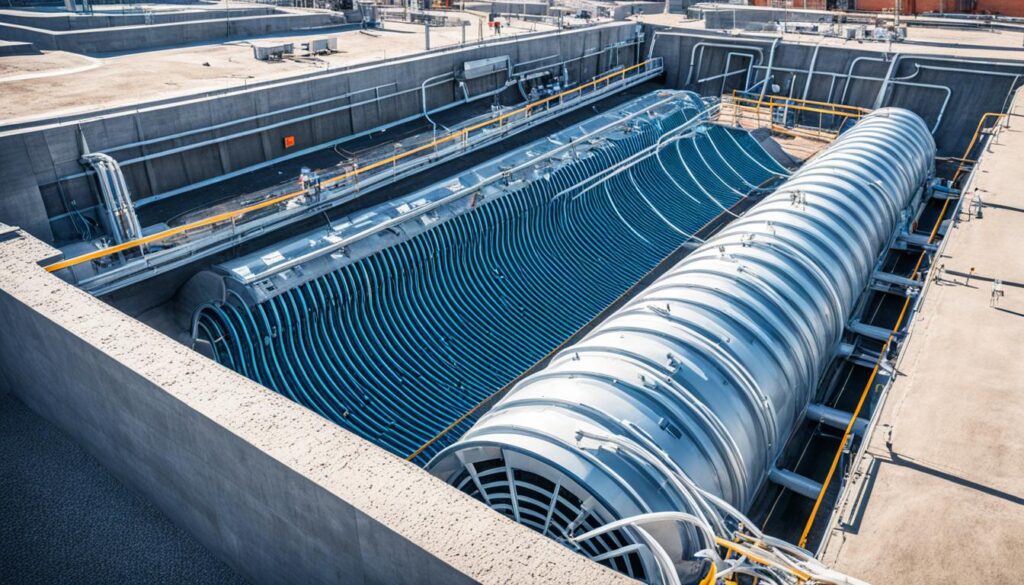
One of the key benefits of geothermal energy is its reliability. Geothermal power plants can operate 24/7, providing a consistent and continuous source of electricity. This is in contrast to solar and wind energy, which are dependent on weather conditions and can experience fluctuations in power output.
Additionally, geothermal energy is considered a clean source of power. The process of generating geothermal energy produces low levels of greenhouse gas emissions, contributing to a healthier environment and a reduced carbon footprint.
However, there are some challenges associated with geothermal energy. The initial costs of drilling and setting up geothermal power plants can be high, making it less accessible for some regions or countries. The availability of suitable geothermal resources is also limited to certain areas with specific geological conditions.
In conclusion, geothermal energy offers tremendous potential as a renewable energy source. Its reliability, low emissions, and continuous power generation make it a viable option for sustainable energy production. However, the initial costs and limited availability of suitable resources pose challenges to its widespread adoption.
Solar Power: Tapping into the Sun’s Energy
Solar power is another renewable energy source that harnesses the energy of the sun. Photovoltaic panels, commonly known as solar panels, convert sunlight into electricity. Solar power has become increasingly popular due to its abundant availability, scalability, and low operating costs. It is a versatile energy source that can be used to generate electricity for residential, commercial, and industrial purposes.
Solar power also has the advantage of being easily scalable, allowing for individual homes to be powered by solar panels or large solar farms to generate electricity for entire communities or cities. By installing photovoltaic panels on rooftops or open spaces, individuals and businesses can directly tap into the sun’s energy and reduce their reliance on traditional power sources.
One of the key advantages of solar power is its sustainability. The sun’s energy is virtually limitless, making solar power a renewable resource that can provide clean energy for generations to come. Furthermore, solar power generation produces zero greenhouse gas emissions, contributing to a cleaner and healthier environment.
However, solar power generation does have its limitations. It is dependent on weather conditions, as the efficiency of photovoltaic panels can be affected by cloud cover and reduced sunlight. Additionally, solar power requires a significant upfront investment in solar panels and infrastructure, although the costs have been decreasing with advancements in technology and economies of scale.
Despite these challenges, the benefits of solar power outweigh the drawbacks, making it a compelling choice for sustainable energy solutions. Solar power not only reduces carbon emissions but also provides energy security, independence, and savings on electricity bills. As countries strive to transition to a clean energy future, solar power is a key player in achieving sustainability and mitigating the impacts of climate change.
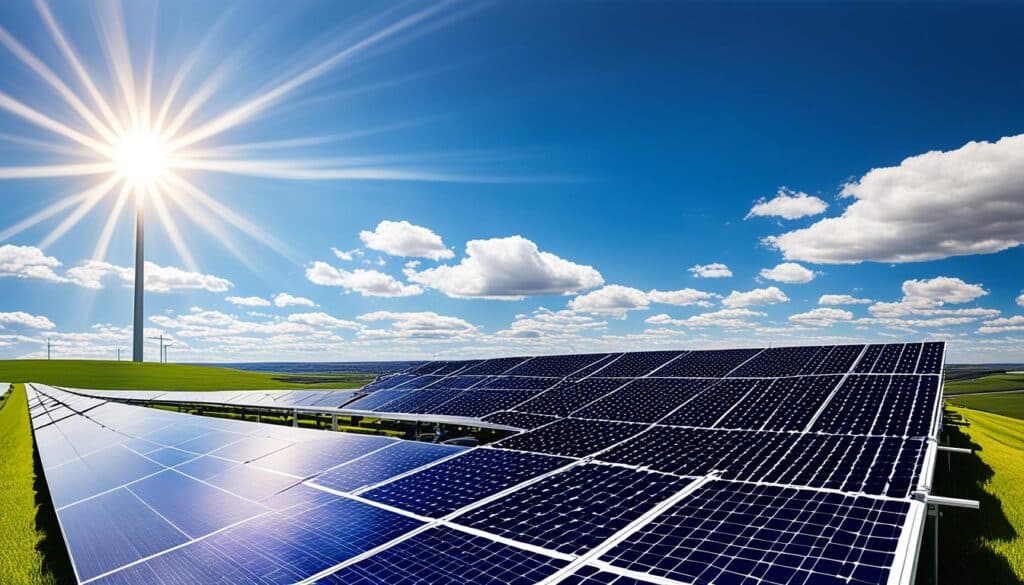
By harnessing the sun’s energy, solar power offers a promising pathway towards a greener and more sustainable future. Its scalability, versatility, and environmental benefits make it a valuable addition to our energy mix. Whether it’s through rooftop solar installations or large-scale solar farms, solar power is paving the way towards a cleaner and brighter tomorrow.
Conclusion
The comparison between geothermal energy and solar power highlights the potential of both sources in contributing to a sustainable and clean energy future. Geothermal energy offers a reliable and continuous source of power with low emissions, making it an attractive option for reducing our dependence on fossil fuels. However, geothermal energy is limited by its availability in specific regions and requires high initial costs for drilling and setting up power plants.
On the other hand, solar power harnesses the abundant energy of the sun and is versatile in its applications. With photovoltaic panels, solar power can generate electricity for residential, commercial, and industrial purposes. Solar power also has the advantage of being easily scalable, allowing for individual homes to be powered by solar panels or large solar farms to provide electricity for entire communities or cities. However, solar power generation is dependent on weather conditions and requires upfront investments in solar panels and infrastructure.
Ultimately, the choice between geothermal energy and solar power depends on the specific requirements, geographical location, and financial considerations. Both sources play a crucial role in diversifying our energy mix and reducing our reliance on fossil fuels. To achieve a sustainable and clean energy future, it is important to explore and invest in a combination of renewable energy sources that are suitable for the unique needs and resources of each region.
FAQ
What is geothermal energy?
Geothermal energy is a renewable energy source that harnesses the heat from the earth’s core to generate electricity and provide heating and cooling for buildings.
What are the advantages of geothermal energy?
The main advantages of geothermal energy are its reliability, low greenhouse gas emissions, and the potential for continuous power generation.
What are the costs associated with geothermal energy?
The initial costs of drilling and setting up geothermal power plants can be high, and the availability of suitable geothermal resources is limited to certain regions.
What is solar power?
Solar power is a renewable energy source that converts sunlight into electricity using photovoltaic panels.
What are the advantages of solar power?
Solar power has abundant availability, scalability, and low operating costs. It is versatile and can be used for residential, commercial, and industrial purposes.
What are the costs associated with solar power?
Solar power requires a significant upfront investment in solar panels and infrastructure and is dependent on weather conditions.
How do geothermal energy and solar power compare?
Geothermal energy offers a reliable and continuous source of power with low emissions but is limited by availability and high initial costs. Solar power harnesses the abundant energy of the sun and is versatile but is dependent on weather conditions and requires upfront investments.
What factors should I consider when choosing between geothermal energy and solar power?
The choice between geothermal energy and solar power depends on specific requirements, geographical location, and financial considerations.
How do geothermal energy and solar power contribute to sustainability?
Both geothermal energy and solar power play a crucial role in diversifying our energy mix and reducing our reliance on fossil fuels, contributing to a sustainable and clean energy future.


